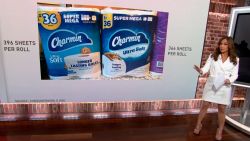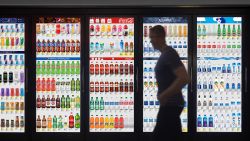T.J. Maxx, Burlington and Ross Stores are bucking the conventional wisdom that consumers trade up for flashier clothes when the economy runs hot.
All three chains increased sales in the most recent quarter, which fell during one of the best consumer environments in recent memory. Comparable sales spiked 7% at TJX Companies (TJX), including 9% at T.J. Maxx, Marshalls, and HomeGoods. They also grew 4.4% at Burlington (BURL), and 3% at Ross (ROST).
“Even in a strong economy where disposable incomes are rising, consumers still enjoy getting a bargain,” said Neil Saunders, managing director at GlobalData Retail.
‘A source of pride’
Rising sales are nothing new for these discounters. TJX’s have expanded for 22 straight years. Ross has recorded 13 consecutive years of growth.
But typically the chains are strongest when the economy is weak and consumers need to cut back. Today, wages are rising, unemployment is near a half-century low and consumer confidence is high.
Instead of heading to higher-price stores, however, low-and-mid-income consumers have remained focused on value, and are spending a little more on clothes, home decor or beauty products at the off-price sellers. Executives tell analysts that shoppers will make unexpected purchases during the holiday season, such as gifts and toys.
These chains are also winning over millennials, who are looking for a bang for their buck, according to Saunders. Burlington, for example, said its average customer was five years younger than those who shop at traditional department stores.
“Finding sales shifted from something to hide to a source a pride,” said Simeon Siegel, a retail analyst at Nomura Instinet. “People don’t see TJX as selling cheap clothing. They see them as selling expensive clothing cheap.”
Discounters have effectively muscled their way into the mainstream. Department stores are now playing catch-up.
Macy’s (M) has added new discount Backstage stores. Sales at Nordstrom (JWN) Rack, the discount version of the brand, even outpaced the company’s full-price business last quarter.
In addition, TJX, Burlington and Ross are getting a lift from the hallowing out of the middle in retail, leaving shoppers with fewer choices to find quality stuff for cheap. Rivals like Macy’s, JCPenney (JCP), and Gap (GPS) have shut stores, Bon-Ton has liquidated, and Sears (SHLD) is on life support.
“As other retailers close doors, or as other retailers liquidate, we’d expect to win some of that business,” Ross’ Chief Operating Officer Michael O’Sullivan told analysts last week.
Turning into the holiday stretch
Flexible business models may also benefit discounters during the holidays and into 2019.
Most traditional retailers have locked in their merchandise months before the holidays. But these chains can respond to consumer trends and pounce on opportunities that open up in just weeks.
When brands produce too many clothes or department stores cancel orders, the discounters swoop in to buy the leftover inventory. That approach allows them to constantly rotate in a new lineup of styles and fashions to drive shoppers to their stores.
“We are nimble in the marketplace,” TJX CEO Ernie Herrman told analysts last week, adding that the chain’s ability to rotate in new products multiple times a week distinguishes it from other big retailers.
The biggest question for discounters in the past has been whether they can bring in enough quality merchandise from their vendors to meet consumer demand, according to Siegel, the Nomura analyst.
Upscale brands and retailers are confident this year that traffic will pick up during the holiday season. They have ramped up their inventories in preparation for consumers to dish out at stores.
That poses an opening for discounters to grab the extra merchandise that will still be sitting on the shelves as traffic slows down after the holidays and retailers need to clear out.
“If things don’t sell at the department store level, that waterfalls down,” Siegel said.
Still, TJX, Burlington, and Ross are not immune to market pressure. TJX and Ross’ stocks were battered last week after the company said freight costs and wage hikes had dragged down profit margins last quarter.
TJX expects rising costs to continue to weigh on earnings. “Unfortunately the environment is not playing into our plans,” CEO Herrman told analysts.
Even so, all three companies’ stock prices are up this year. Burlington has led the pack, gaining 35%.






















